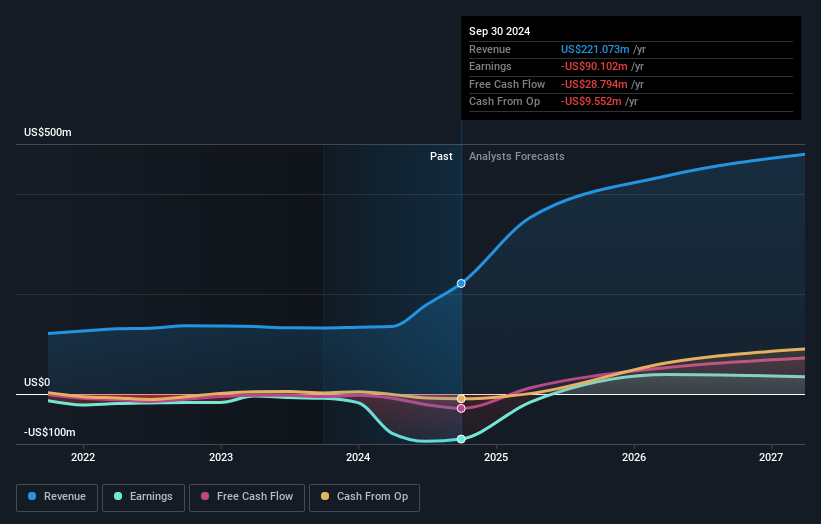- United States
- /
- Electronic Equipment and Components
- /
- NasdaqGM:AIOT
Institutional investors in PowerFleet, Inc. (NASDAQ:AIOT) see US$58m decrease in market cap last week, although long-term gains have benefitted them.

Key Insights
- Significantly high institutional ownership implies PowerFleet's stock price is sensitive to their trading actions
- 51% of the business is held by the top 20 shareholders
- Recent sales by insiders
If you want to know who really controls PowerFleet, Inc. (NASDAQ:AIOT), then you'll have to look at the makeup of its share registry. The group holding the most number of shares in the company, around 60% to be precise, is institutions. Put another way, the group faces the maximum upside potential (or downside risk).
Institutional investors endured the highest losses after the company's market cap fell by US$58m last week. However, the 112% one-year return to shareholders might have softened the blow. But they would probably be wary of future losses.
In the chart below, we zoom in on the different ownership groups of PowerFleet.
See our latest analysis for PowerFleet

What Does The Institutional Ownership Tell Us About PowerFleet?
Institutions typically measure themselves against a benchmark when reporting to their own investors, so they often become more enthusiastic about a stock once it's included in a major index. We would expect most companies to have some institutions on the register, especially if they are growing.
As you can see, institutional investors have a fair amount of stake in PowerFleet. This implies the analysts working for those institutions have looked at the stock and they like it. But just like anyone else, they could be wrong. If multiple institutions change their view on a stock at the same time, you could see the share price drop fast. It's therefore worth looking at PowerFleet's earnings history below. Of course, the future is what really matters.

Investors should note that institutions actually own more than half the company, so they can collectively wield significant power. PowerFleet is not owned by hedge funds. Disciplined Growth Investors, Inc. is currently the largest shareholder, with 6.7% of shares outstanding. Meanwhile, the second and third largest shareholders, hold 5.4% and 5.1%, of the shares outstanding, respectively. In addition, we found that Steve Towe, the CEO has 0.5% of the shares allocated to their name.
Looking at the shareholder registry, we can see that 51% of the ownership is controlled by the top 20 shareholders, meaning that no single shareholder has a majority interest in the ownership.
Researching institutional ownership is a good way to gauge and filter a stock's expected performance. The same can be achieved by studying analyst sentiments. There are plenty of analysts covering the stock, so it might be worth seeing what they are forecasting, too.
Insider Ownership Of PowerFleet
The definition of an insider can differ slightly between different countries, but members of the board of directors always count. Company management run the business, but the CEO will answer to the board, even if he or she is a member of it.
Most consider insider ownership a positive because it can indicate the board is well aligned with other shareholders. However, on some occasions too much power is concentrated within this group.
Shareholders would probably be interested to learn that insiders own shares in PowerFleet, Inc.. In their own names, insiders own US$46m worth of stock in the US$880m company. Some would say this shows alignment of interests between shareholders and the board. But it might be worth checking if those insiders have been selling.
General Public Ownership
With a 35% ownership, the general public, mostly comprising of individual investors, have some degree of sway over PowerFleet. This size of ownership, while considerable, may not be enough to change company policy if the decision is not in sync with other large shareholders.
Next Steps:
It's always worth thinking about the different groups who own shares in a company. But to understand PowerFleet better, we need to consider many other factors. For instance, we've identified 3 warning signs for PowerFleet (1 is a bit concerning) that you should be aware of.
If you would prefer discover what analysts are predicting in terms of future growth, do not miss this free report on analyst forecasts.
NB: Figures in this article are calculated using data from the last twelve months, which refer to the 12-month period ending on the last date of the month the financial statement is dated. This may not be consistent with full year annual report figures.
New: Manage All Your Stock Portfolios in One Place
We've created the ultimate portfolio companion for stock investors, and it's free.
• Connect an unlimited number of Portfolios and see your total in one currency
• Be alerted to new Warning Signs or Risks via email or mobile
• Track the Fair Value of your stocks
Have feedback on this article? Concerned about the content? Get in touch with us directly. Alternatively, email editorial-team (at) simplywallst.com.
This article by Simply Wall St is general in nature. We provide commentary based on historical data and analyst forecasts only using an unbiased methodology and our articles are not intended to be financial advice. It does not constitute a recommendation to buy or sell any stock, and does not take account of your objectives, or your financial situation. We aim to bring you long-term focused analysis driven by fundamental data. Note that our analysis may not factor in the latest price-sensitive company announcements or qualitative material. Simply Wall St has no position in any stocks mentioned.
About NasdaqGM:AIOT
PowerFleet
Provides Internet-of-Things solutions in the United States, Israel, and internationally.
High growth potential slight.
Similar Companies
Market Insights
Community Narratives




